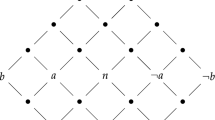Abstract
Belief revision is both a philosophical and logical problem. From Popper’s logic of scientific discovery, we know that revision is ubiquitous in physics and other sciences. The AGM postulates and R-calculus are approaches from logic, where the R-calculus is a Gentzen-type concrete belief revision operator. Because deduction is undecidable in first-order logic, we apply approximate deduction to derive an R-calculus that is computational and has finite injury. We further develop approximation algorithms for SAT problems to derive a feasible R-calculus based on the relation between deduction and satisfiability. In this manner, we provide a full spectrum of belief revision: from philosophical to feasible revision.
Similar content being viewed by others
References
Popper K. The Logic of Scientific Discovery. New York: Routledge, 1959
Popper K. Conjectures and Refutations. London: Routledge, 1963
Gärdenfors P, Rott H. Belief revision. In: Handbook of Logic in Artificial Intelligence and Logic Programming: Vol.4: Epistemic and Temporal Reasoning. Oxford: Oxford Science Publications, 1995. 35–132
Alchourrón C E, Gärdenfors P, Makinson D. On the logic of theory change: partial meet contraction and revision functions. J Symbo Logic, 1985, 50: 510–530
Bochman A. A foundational theory of belief and belief change. Artif Intell, 1999, 108: 309–352
Fermé E, Hansson S O. AGM 25 years, twenty-five years of research in belief change. J Philos Logic, 2011, 40: 295–331
Friedman N, Halpern J Y. Belief revision: a critique. J Logic Language Inf, 1999, 8: 401–420
Darwiche A, Pearl J. On the logic of iterated belief revision. Artif Intell, 1997, 89: 1–29
Li W. R-calculus: an inference system for belief revision. Comput J, 2007, 50: 378–390
Friedberg R M. Two recursively enumerable sets of incomparable degrees of unsolvability. Proc Natl Acad Sci, 1957, 43: 236–238
Muchnik A A. On the separability of recursively enumerable sets (in Russian). Dokl Akad Nauk SSSR, 1956, 109: 29–32
Rogers H. Theory of Recursive Functions and Effective Computability. Cambridge: the MIT Press, 1987
Soare R I. Recursively Enumerable Sets and Degrees, a Study of Computable Functions and Computably Generated Sets. Berlin: Springer-Verlag, 1987
Takeuti G. Proof theory. In: Handbook of Mathematical Logic. Amsterdam: North-Holland. 1987
Li W, Sui Y F. The R-calculus and the finite injury priority method. In: Proceedings of IEEE International Conference on Robotics & Automation, Singapore, 2017. 2329–2335
Asano T. Approximation algorithms for MAX SAT: Yannakakis vs. Goemans-Williamson. In: Proceedings of the 5th Israel Symposium on Theory of Computing and Systems, Ramat-Gan, 1997. 24–37
Battiti R, Protasi M. Approximate algorithms and heuristics for MAXSAT. In: Handbook of Combinatorial Optimization. Boston: Springer, 1998. 77–148
Hochbaum D S. Approximation Algorithms for NP-Hard Problems. Boston: PWS Publishing Company, 1997
Katsuno H, Mendelzon A O. Propositional knowledge base revision and minimal change. Artif Intell, 1991, 52: 263–294
Li W, Sui Y F, Sun M Y. The sound and complete R-calculus for revising propositional theories. Sci China Inf Sci, 2015, 58: 092101
Acknowledgements
This work was supported by National Basic Research Program of China (973 Program) (Grant No. 2005CB321901), Open Fund of the State Key Laboratory of Software Development Environment (Grant No. SKLSDE-2010KF-06), and Beijing University of Aeronautics and Astronautics.
Author information
Authors and Affiliations
Corresponding author
Rights and permissions
About this article
Cite this article
Li, W., Sui, Y. A computational framework for Karl Popper’s logic of scientific discovery. Sci. China Inf. Sci. 61, 042101 (2018). https://doi.org/10.1007/s11432-017-9199-8
Received:
Accepted:
Published:
DOI: https://doi.org/10.1007/s11432-017-9199-8



